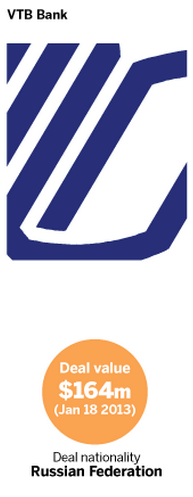Blog Post
Fact: Dim Sum bonds are not coming to rescue Russia’s banks
Despite Russian efforts, it seems Asian markets will not provide a quick fix, as yields on yuan-denominated bonds issued by Russian entities have been increasing after the sanctions.
The imposition of joint US-EU sanctions meant a significant number of investment opportunities for both Russian companies and banks disappeared. Despite Russian efforts, it seems Asian markets will not provide a quick fix, as yields on yuan-denominated bonds issued by Russian entities have been increasing after the sanctions.
China and Russia are getting increasingly closer economically and financially. China matters more and more in Russia’s export and Russia reached a $400 billion agreement in May 2014 to supply natural gas to China through a new pipeline over 30 years. Bloomberg reports the ruble-yuan currency pair reached a record 3.8 billion rubles in trading volume ($105 million) on July 31st 2014.
As the US and the EU imposed new sanctions this summer, Russian companies and banks were therefore prompted – being traditionally reliant on dollar-denominated syndicated loans – to look to China for a financial escape route.
Dim sum is the name used to indicate bonds denominated in Chinese yuan and issued in Hong Kong, attractive to foreign investors who wish to get into yuan-denominated assets, but are restricted by China’s capital controls from investing in domestic Chinese debt. The issuers of dim sum bonds are largely entities based in China or Hong Kong, and occasionally foreign companies. Dim sum bonds issuance has been going a bit up and down during 2012 and 2013, probably due in part to concerns about the Chinese economy (Figure 1 from WSJ).
Russian companies are not new to the renminbi market and Dim Sum bonds issuance. In early 2013, Russian banks – including JSC VTB Bank, Russian Agricultural Bank OAO and Russian Standard Bank ZA– had already raised $482m, compared to $477m by Chinese companies and compared to the just $309 million issued over the previous three years (Figure 2 from FT).

These developments seem to have been mostly demand driven. Comments reported in the FT and the WSJ suggest that investors are keen to buy these bonds because being issued by state-backed Russian banks they offer an attractive yield and exposure to the Chinese currency while having a lower risk profile than many of the local issuers. For Russian banks themselves, dim sum bonds represented a significantly cheaper source of funding. Russian Agricultural Bank for example issued in 2013 a three-year dim sum bond with a yield of 3.6 per cent, compared to a comparable (slightly longer maturity) dollar bond, that paid a coupon of 5.3 per cent.
In the immediate aftermath of sanctions, therefore, a question was whether Asia’s capital markets could serve as an easy funding alternative for Russian companies frozen out of the US and Europe.
It looks like this is not going to be so easy. Yields on Russian corporate bonds denominated in yuan have been rising after the sanctions (IFR Asia). The yield on VTB’s 4.5% October 2015 offshore renminbi bonds rose to around 6% in end of July from less than 4% on July 24, while Russian Agricultural Bank’s 3.6% February 2016s were quoted at between 5% and 6.6%, up from 4.67% on July 16. Both banks were added to the list of those subject to US sanctions last week. The yield on Gazprombank’s 4.25% January 2017 Dim Sum bonds rose to 6.5% from 5.01% on July 16, the day Gazprombank was hit with US sanctions.
These data suggest that Asian investors may be becoming increasingly wary of credits from Russia and worried of the impact of sanctions, even if they are not directly involved. And the dim sum way around western sanctions may prove harder than expected.
Read more on China and Russia
China seeking to cash in on Europe’s crises
Republishing and referencing
Bruegel considers itself a public good and takes no institutional standpoint. Anyone is free to republish and/or quote this post without prior consent. Please provide a full reference, clearly stating Bruegel and the relevant author as the source, and include a prominent hyperlink to the original post.











